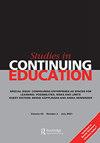Skilling up a workforce in neoliberal times: a case study of professional learning in Neighbourhood Houses in Australia
IF 1.9
4区 教育学
Q2 EDUCATION & EDUCATIONAL RESEARCH
引用次数: 0
Abstract
ABSTRACT Neighbourhood Houses in Australia are community place-based organisations that provide education, support services, and develop responses to local issues with local communities. The practices within Neighbourhood Houses are informed by community development. Yet knowledge, understanding and practices of community development vary across the workforce. In 2019, Neighbourhood Houses Victoria commenced a programme of professional learning for the workforce. This paper draws on data from an impact evaluation and examines the benefits and barriers to embedding a professional learning programme in community development within its workforce. Using practice theory to examine the tensions and contradictions inherent in delivering professional learning in neoliberal times of managerialism and accountability in not-for-profit organisations. The contradictions of practice will resonate with organisations seeking to implement a professional learning across a broad range of human service organisations such as settlement houses, human services and community education settings. We claim most not-for-profit workforces are impacted by the discursive practices of neoliberalism such as contractual arrangements and the adoption of business practices to comply with funding requirements. These compliance requirements contrast with the philosophy and practices of community development and have the potential to impact on professional learning and the practices within these workplaces.新自由主义时代的劳动力培训:澳大利亚邻里住宅专业学习案例研究
摘要澳大利亚的邻里之家是以社区为基础的组织,提供教育、支持服务,并与当地社区一起制定应对当地问题的措施。社区发展为社区住宅的实践提供了信息。然而,不同的劳动力对社区发展的知识、理解和实践各不相同。2019年,维多利亚邻里之家开始了一项针对劳动力的专业学习计划。本文利用影响评估的数据,研究了将专业学习计划纳入社区发展的好处和障碍。运用实践理论来审视在非营利组织中管理主义和问责制的新自由主义时代提供专业学习所固有的紧张和矛盾。实践的矛盾将引起寻求在广泛的人类服务组织(如安置所、人类服务和社区教育环境)中实施专业学习的组织的共鸣。我们声称,大多数非营利劳动力都受到新自由主义话语实践的影响,如合同安排和采用商业实践来满足资金要求。这些合规要求与社区发展的理念和实践形成对比,并有可能影响这些工作场所的专业学习和实践。
本文章由计算机程序翻译,如有差异,请以英文原文为准。
求助全文
约1分钟内获得全文
求助全文
来源期刊

Studies in Continuing Education
EDUCATION & EDUCATIONAL RESEARCH-
CiteScore
4.70
自引率
6.70%
发文量
22
期刊介绍:
Studies in Continuing Education is a scholarly journal concerned with all aspects of continuing, professional and lifelong learning. It aims to be of special interest to those involved in: •continuing professional education •adults learning •staff development •training and development •human resource development
 求助内容:
求助内容: 应助结果提醒方式:
应助结果提醒方式:


